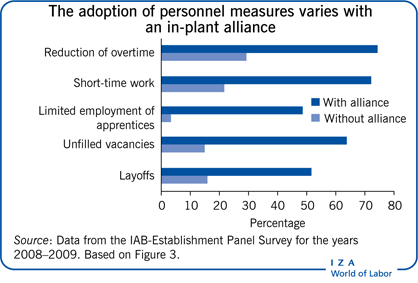Elevator pitch
In-plant alliances are plant-specific deviations from sectoral collective agreements related to wages and working time that are intended to hold down labor costs. These agreements enable firm-level reorganizations to respond to an imminent economic crisis or to improve competitiveness. They also encourage social partners to take greater responsibility for employment issues. Both unions and works councils agree to such contracts because they see them as helpful in avoiding severe employment losses. Thus, these alliances substantially unburden public employment policy.

Key findings
Pros
In-plant alliances can help firms survive, save jobs, and foster employment.
Labor costs may be reduced due to in-plant alliances, thereby indirectly fostering increased employment.
More flexible working-time regulations and reorganizations as part of in-plant alliances increase both labor productivity and firm competitiveness, contributing to an increase in employment.
In-plant alliances encourage social partners to take greater responsibility for employment issues.
Cons
Labor markets may be distorted by in-plant alliances because they favor insiders over outsiders thereby reducing the employment chances of outsiders.
Employment expectations could be exaggerated if in-plant alliances are seen as bucking market trends.
Sectoral collective agreements may be eroded by in-plant alliances.
In-plant alliances cannot deviate “too much” from the collective agreement because unions would not agree to that.
Reductions in working time seem to be better implemented via other collective agreements such as sectoral- and/or firm-level agreements rather than through in-plant alliances.